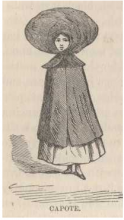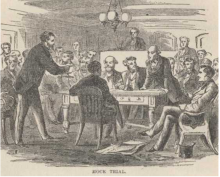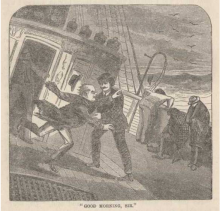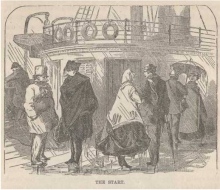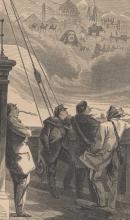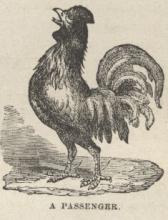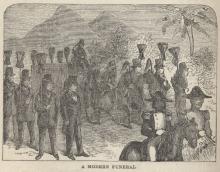In this chapter we learn all about ship time and how to chase the moon. The Innocents Abroad was written using Twain's journal as well as his correspondences to the Daily Alta California as well as other journals, including the New York Tribune. This chapter, chapter 5 and chapter 6 are covered by two separate letters that overlap to some extent. One to each of these two journals. Included with this page is a copy of the letter sent to the New York Tribune as it contains a description of Mr Blucher's dinner on Fayal.
With this chapter we hear of the many diversions offered passengers: Horse billiards (shuffleboard), journal writing, Magic Lantern shows, dancing on a rolling deck, mock trials and charades. What I think to be the most interesting point in this chapter is the observation of the executive officer:
I (my Second Life avatar) has been reading sketches and chapters from the works of Mark Twain since March of this year (2011). I don't really know why I started doing this other than to create some interesting content for my web site and to try to come up with some justification for playing around in that virtual realm of Second Life. I've long been a fan of Mark Twain but not a scholar. I must say, however, that with just the small portion I've worked on, my appreciation for his works has increased.
Lying still at anchor, just inside the harbor, on a Sunday. Come Monday they sail into high seas and Mark finds great joy in celebrating the sea sickness of his fellow travelers. He is mystified by the presence of five ship captains on the voyage.
Stormy and dreary the ship casts off then lies at anchor just at the harbor entrance. The seas are to high to proceed. "We would have shone at a wake, but not at anything more festive."
Mr. Blucher's opinion was first published in the Daily Alta California June 30, 1867 but written May 19th.
This is an enhanced version of chapter 2. I've learned some new techniques with audacity and with dvd-slideshow.
Mark has booked passage on an excursion to the Holy land on board the steamer Quaker City. Included here is a clipping from Daily Alta California dated June 6, 1867. The paper was published August 18, 1867. The clipping concerns Mark's activities the day before boarding. The pdf that the clipping originally came from was made available by California Digital Newspaper Collection
His first mention of the trip, as published in the Daily Alta California is dated April 9, 1867
There is a wonderful moment in this chapter when Twain steps out on deck of the schooner at night in the moonlight. The description of his vista is almost transcendent.
I've recently been responding to various requests to sign petitions related to Obama's environmental treachery, the latest being the Keystone pipeline project and canceling of EPA standards. One response I got on a Facebook post was what looked to be a rather cynical request to explain why humans were to blame for the "Little Ice Age" (LIA).
This is a rather tedious chapter but may be of interest to those interested in traditional funeral practices of native Hawaiians. This is a good example of Twain padding his chapters (my opinion).
Earlier today I had the desire to play some old Donovan music. I have an lp of his. I looked up some of the tunes on Wikipedia and found that the tune Lalena was actually named for Lotte Lenya, the singer/actress famous for her role in Kurt Weill's The Three Penny Opera, among other roles. I wonder how many of you out there have heard of it or him. Once upon a time Bobby Darin had a hit with a tune from The Three Penny Opera, Mack the Knife. But then who now remembers Bobby Darin.
Subscribe to
© 2025 B Scott Holmes, All rights reserved.
